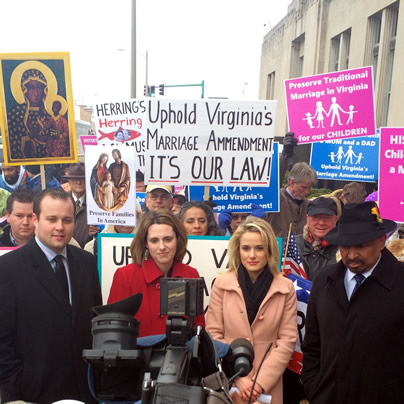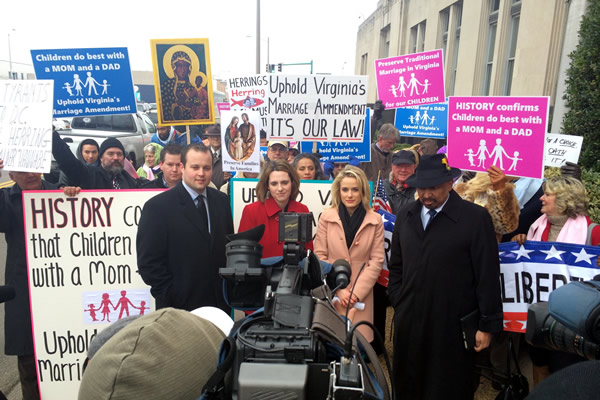Local
Lawyer: Va. marriage ban necessary for ‘procreation’
Anti-gay Alliance Defending Freedom files brief with federal appeals court


A lawyer with the Alliance Defending Freedom argues in a brief submitted to the 4th U.S. Circuit Court of Appeals that Virginia’s same-sex marriage ban is necessary for “procreation.” (Photo courtesy of the Family Foundation of Virginia)
A lawyer for an anti-gay legal group said in a brief filed with a federal appeals court on March 28 that Virginia’s same-sex marriage ban is necessary for the “procreation” of children.
“Redefining marriage harms marriage’s ability to serve those interests by serving marriage’s inherent connection to procreation and communicating that the primary end of marriage laws is to affirm adult desires rather than serve children’s needs, and suppressing the importance of both mothers and fathers to children’s development,” wrote Byron J. Babione of the Alliance Defending Freedom in a brief he filed with the 4th U.S. Circuit Court of Appeals in Richmond, Va., on behalf of Prince William County Circuit Court Clerk Michèle McQuigg.
Babione argued that U.S. District Judge Arenda L. Wright Allen “sought to discredit these procreation- and child-focused purposes for marriage” in her Feb. 13 ruling that struck down Virginia’s constitutional amendment that defines marriage as between a man and a woman.
“Plaintiffs ask this court to use the law’s power to redefine the institution of marriage,” said Babione. “That redefinition would transform marriage in the public consciousness from a gendered to a genderless institution – a conversation that would be swift and unalterable, the gendered institution having been declared unconstitutional.”
Babione also cites the Witherspoon Institute in his brief to make the argument that it is “best for a child to be reared by his or her own mother and father.” The New Jersey-based conservative think tank largely funded Mark Regnerus’ study on the issue that a federal judge earlier this month dismissed as “entirely unbelievable and not worthy of serious consideration” in his ruling that struck down Michigan’s same-sex marriage ban.
“Genderless marriage communicates that marriage exists primarily for the government to approve emotional or romantic bonds, because those sorts of bonds (and not sexual conduct of the type that creates children) would be the prominent feature shared by the couples who marry,” said Babione.
David B. Oakley, who represents Norfolk Circuit Court Clerk George Schaefer, III, in the case, said in a separate brief he filed with the federal appeals court on March 28 that Allen “began her opinion with the misconception that Virginia’s definition of marriage is solely based upon prejudice and animus towards gay and lesbian couples.” She opened her ruling with a quote from Mildred Loving, whose challenge of Virginia’s interracial marriage ban prompted the U.S. Supreme Court to issue its landmark Loving v. Virginia decision in 1967.
Oakley further argued Schaefer and others who issue marriage licenses would “face exposure to additional lawsuits” from those denied them if the 4th Circuit upholds Allen’s ruling.
“Same-sex marriage proponents want to open the door of marriage for their benefit and then slam it shut behind them,” wrote Oakley. “It will not be long before other groups come knocking.”
Court records indicate the Family Research Council on March 26 sought to file an amicus brief in the Bostic case, but the federal appeals court blocked it as “premature.” The Washington Blade was unable to immediately obtain a copy of the filing.
Timothy Bostic and Tony London of Norfolk and Carol Schall and Mary Townley of Chesterfield last year challenged the commonwealth’s marriage amendment. The American Civil Liberties Union and Lambda Legal – who filed a separate lawsuit last summer on behalf of Victoria Kidd and Christy Berghoff of Winchester and Joanne Harris and Jessica Duff of Staunton – have been allowed to join the Bostic case.
U.S. District Judge Michael F. Urbanski in January certified the ACLU and Lambda Legal lawsuit as a class action.
The federal appeals court on May 12 is scheduled to hear oral arguments in the Bostic case.
Attorney General Mark Herring earlier this year announced he would not defend Virginia’s marriage amendment that voters in 2006 approved by a 57-43 percent margin.
Briefs from the lawyers who are representing the plaintiffs are due to the court on April 11.
“Our attorneys will review the briefs from the clerks and will respond as appropriate in the brief the commonwealth will file by the April 11 deadline,” Herring spokesperson Michael Kelly told the Blade.
District of Columbia
D.C. Black Pride theme, performers announced at ‘Speakeasy’
Durand Bernarr to headline 2026 programming

The Center for Black Equity held its 2026 DC Black Pride Theme Reveal event at Union Stage on Monday. The evening, a “Speakeasy Happy Hour,” was hosted by Anthony Oakes and featured performances by Lolita Leopard and Keith Angelo. The Center for Black Equity organizes DC Black Pride.
Kenya Hutton, Center for Black Equity president and CEO, spoke following the performances by Leopard and Angelo. Hutton announced this year’s theme for DC Black Pride: “New Black Renaissance.”
Performers for 2026 DC Black Pride were announced to be Bang Garcon, Be Steadwell, Jay Columbus, Bennu Byrd, Rue Pratt and Akeem Woods.
Singer-songwriter Durand Bernarr was announced as the headliner for the 2026 festivities. Bernerr gave brief remarks through a video played on the screen at the stage.
DC Black Pride is scheduled for May 22-25. For more information on DC Black Pride, visit dcblackpride.org.
Virginia
Arlington LGBTQ bar Freddie’s celebrates 25th anniversary
Owner asks public to support D.C.-area gay bars

An overflowing crowd turned out Sunday night, March 1, for the 25th anniversary celebration of Freddie’s Beach Bar, the LGBTQ bar and restaurant located in the Crystal City section of Arlington, Va.
The celebration began as longtime patrons sitting at tables and at the bar ordered drinks, snacks, and full meals as several of Freddie’s well-known drag queens performed on a decorated stage.
Roland Watkins, an official with Equality NoVa, an LGBTQ advocacy organization based in the Northern Virginia areas of Arlington, Alexandria, and Fairfax County, next told the gathering about the history of Freddie’s Beach Bar and the role he said that owner Freddie Lutz has played in broadening the bar’s role into a community gathering place.
“Twenty-five years ago, opening a gay bar in Arlington was not a given,” Watkins told the crowd from the stage. “It took courage, convincing, and a deep belief that our community belongs openly, visibly, and proudly,” he said. “And that belief came from Freddie.”
Watkins and others familiar with Freddie’s noted that under Lutz’s leadership and support from his staff, Freddie’s provided support and a gathering place for LGBTQ organizations and a place where Virginia elected officials, and candidates running for public office, came to express their support for the LGBTQ community.
“Over the past 25 years, Freddie’s has become more than a bar,” Watkins said. “It has become a community maker.”
Lutz, who spoke next, said he was moved by the outpouring of support from long-time customers. “Thank you all so much for coming tonight and thank you all so much for your support over the past 25 years,” he said. “I can’t tell you how much that means to me and how much it’s kept me going.”
But Lutz then said Freddie’s, like many other D.C. area gay bars, continues to face economic hard times that he said began during the COVID pandemic. He noted that fewer customers are coming to Freddie’s in recent years, with a significant drop in patronage for his once lucrative weekend buffet brunches.
“So, I don’t want to be the daddy downer on my 25-year anniversary,” he said. “But this was actually the worst year we’ve ever had,” he added. “And I guess what I’m asking is please help us out. Not just me, but all the gay bars in the area.” He added, “I’m reaching out and I’m appealing to you not to forget the gay bars.”
Lutz received loud, prolonged applause, with many customers hugging him as he walked off the stage.

In an official statement released at the reveal event Capital Pride Alliance described its just announced 2026 Pride theme of “Exist, Resist, Have the Audacity” as a “bold declaration affirming the presence, resilience, and courage of LGBTQ+ people around the world.”
The statement adds, “Grounded in the undeniable truth that our existence is not up for debate, this year’s theme calls on the community to live loudly and proudly, stand firm against injustice and erasure, and embody the collective strength that has always defined the LGBTQ+ community.”
In a reference to the impact of the hostile political climate, the statement says, “In a time when LGBTQ+ rights and history continue to face challenges, especially in our Nation’s Capital, where policy and public discourse shape the future of our country, together, we must ensure that our voices are visible, heard, and unapologetically centered.”
The statement also quotes Capital Pride Alliance CEO and President Ryan Bos’s message at the Reveal event: “This year’s theme is both a declaration and a demand,” Bos said. “Exist, Resist, Have Audacity! reflects the resilience of our community and our responsibility to protect the progress we’ve made. As we look toward our nation’s 250th anniversary, we affirm that LGBTQ+ people have always been and always will be part of the United States’s history, and we will continue shaping its future with strength and resolve,” he concluded.
-

 India4 days ago
India4 days agoActivists push for better counting of transgender Indians in 2026 Census
-

 Advice4 days ago
Advice4 days agoDry January has isolated me from my friends
-

 District of Columbia4 days ago
District of Columbia4 days agoCapital Pride reveals 2026 theme
-

 National4 days ago
National4 days agoAfter layoffs at Advocate, parent company acquires ‘Them’ from Conde Nast


















